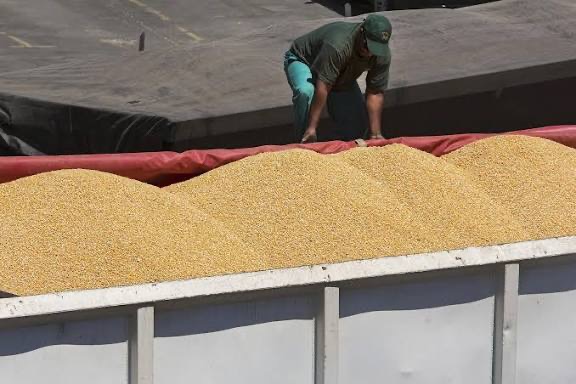By Naledi Nyoni
BULAWAYO — Zimbabwe’s second-largest milling company, Blue Ribbon Foods, has halted operations at its Bulawayo plant due to an acute shortage of locally available maize.
The shutdown, confirmed Monday during a site visit, starkly contrasts with government claims of a national grain surplus.
“We have seven silos outside, each holding about 180 tonnes.
“They’ve been empty since April. We are wondering when they will reach full capacity again,” said Nqabutho Mkhize, Blue Ribbon’s Sales Coordinator for Matabeleland North.
At full capacity, the company runs two shifts daily, employing 34 workers per shift and producing up to 60 tonnes of maize meal.
But production has been silent for months.
“All we can do is hope the situation changes soon. Our workers are hanging in the balance,” Mkhize added.
The closure follows repeated government assurances.
In May, President Emmerson Mnangagwa announced a “bumper harvest,” echoed by agriculture minister Anxious Masuka, who claimed a cereal harvest of 2.9 million tonnes—well above the 2.2 million-tonne national requirement.
Reality, however, tells a different story. “We used to get maize locally, easily,” said David Moyo, chairperson of the Grain Millers Association of Zimbabwe (GMAZ) Southern Region. “Now it’s hard to fill even a 30-tonne truck. Sometimes all we get is two or three 50kg bags a day.”
The government banned maize imports in June, apparently based on overstated harvest figures.
Several other companies, including Sunset Marketing, National Foods, Mathokozisi Milling, and Bulateke Milling, have already downsized or laid off staff due to supply shortages and regulatory hurdles.
“We are asking authorities to help fill the gap.
“These regulations are making a bad situation worse.
“We don’t want to shut down permanently; we want to feed the nation,” Moyo said.
Trade analysts warn Zimbabwe could face a major grain shortage within weeks if the import ban continues.
Jacques Pieener of Commodity Insight Africa described the government’s reluctance as “political” and cautioned that millers are already running dry, threatening production and soaring mealie meal prices.
Economist Tinashe Murapata noted, “Zimbabwe’s maize production was around one million metric tonnes, not the 2.3 million envisaged in the 2025 budget. How did we get these numbers so flagrantly wrong?”
The ongoing closure of key milling plants threatens urban food security, risks job losses, and could drive mealie meal prices higher, compounding inflationary pressures.
“We are not asking for handouts,” Moyo said.
“The private sector can complement government efforts, but maize imports must be deregulated to allow market forces to set prices and ensure affordable food for all Zimbabweans.”



